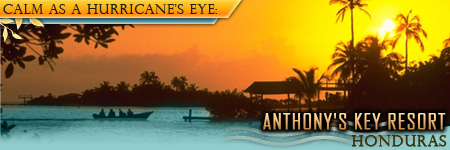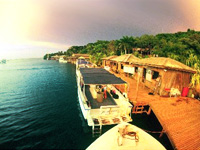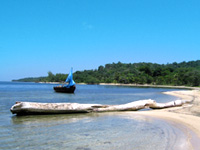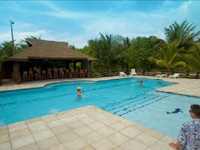|

By Amanda Castleman
As the water level drops, I make unfortunate eye contact with the bartender. He trembles like a wind-whipped palm, chuckling silently, stealthily.
 |
Fair enough. For five minutes, I've been slouching around the patio in a flooded dive mask: a cartoony cat-with-head-caught-in-fishbowl effect. No bikini can counterbalance that poolside faux pas.
But I'll take the heat. I've traveled some 3,000 miles to earn my scuba certification in Roatan, Honduras. Soon the Caribbean Sea will brim into my mask. Calm as a hurricane's eye, I'll snort, bubbling away the liquid, and pass the exam. Or so I hope.
I smile. "Practice.”
"No worries, mamma," he turns – but not quickly enough to hide the next slow shudder of laughter.
Everything in Honduras is slow, slow as I've never experienced. Heat leaches muscle fiber, skeletal strength and all ambition. Coral sand grits under my bare feet, after the espadrilles unlace. Even the lightning pulses long and lazy on the ocean's horizon.
Tropical diving downshifts yet another gear, if such a thing is possible. My breath rags steady through the regulator's mouthpiece. "Zschhhuuurrrrrrr," I sip the sterile air. "Hhhkkkbbbrrrrrr," I exhale it into the sea, where the Bay Islands guard the Central American reef’s east flank.
Texas John, my PADI instructor at Anthony's Key Resort, settles before me on the ocean floor. "You, mask-off," he gestures. I've read all the theory, practiced the sign language and filled in the appropriate circles with a Number Two pencil. Removing my mask 32 feet down is another matter entirely.
I close my eyes, so weak anyway. Slow, slow, go slow. I quiet my pulse, steady the contractions of my lungs: an exercise in both control and flow.
My hands rip away the veil, the plastic plates that focus this underwater world.
The first breath rides the jaggedey edge, then smoothes. I trace the second, spiraling inside myself like a nautilus shell. The third purrs. I am home at last, as adrift in grace as an embryo.
 |
Almost reluctantly, I fumble the rubber strap over my forehead and braids, then blast the water from my mask. Texas John slaps a high-five and does a little Snoopy dance of celebration. The pool practice – however ridiculous – paid off. And then the Caribbean unfurls, seemingly for me alone.
A sea turtle, stubby limbs starfishing from its silver-dollar center, drifts past. I revolve into a canyon, built by generation upon generation of polyps straining toward the sun. Parrotfish – flat, wide slabs – scrape algae with their teeth, bunched tight as fistfuls of pins. Over-eager, they grind the coral too, excreting clouds of waste: sand that someday might inspire a resort brochure. Their chawing forms a merengue downbeat to the sea's soundtrack.
A barracuda hovers, a steady steel streak where the open water yawns. I want to blaze into that blue: the eternal stretch of turquoise, the slow fade to black. Reefer madness, indeed.
I turn, instead, and shadow my dive buddy, Nathan, who somersaults and twirls, even giddier than me. A jellyfish wavers behind his head like a halo. Sun gilds the tuxedo-shirt ruffles of a honey-colored brain coral. Our fingers write words on the water. How much air? 1,200psi? OK. Look – an Oedipal stab toward the pupils. There – a finger pokes toward three shimmering squids.
All too soon, Texas John shepherds us to the surface. He makes no comment, as we pass our fins onboard, then lurch up the ladder. The waterlogged gear, the steel tank, my heart: everything drags me downward. I grab a stranger's hand and lunge against gravity, fighting the dream of the deep.
Then the instructor booms: "We have two newly certified divers onboard!" Applause patters like the coral crunch of parrotfish. Though elated, I want only to resubmerge – taking one more giant stride for womankind off the boat's stern.
 |
I peel my short wetsuit to the waist and coat 30-proof sunblock on my pale skin. Then I hang from the awning's frame and watch the jungle streak past. I'm licensed to dive. At last. Two decades after my heart broke, discovering women could not become SEALS. Fourteen years since I stopped swimming competitively and fishing tweens from the YMCA pool as a minimum-wage lifeguard. And a mere seven months after my baby cousin – a tattooed wildcat of a Navy diver – died from cancer.
Ryan McCleskey would have loved this moment, I know. He'd have teased: "You almost chumped the mask-test, Amy, but the Castleman cool saved your sorry Yankee butt!"
A real-time shout slices through my reverie. "Shark-whale-dolphin-thingy starboard!"
Our vessel slugs to a stop. We float breathless, scanning the sea. One dorsal fin arcs over the waves, then another and another and another. A pod of pilot whales surrounds us: 20- maybe 40-strong. Who can count? The creatures are everywhere, cresting in slow swells to the surface. They resemble sleek submarines that suffered head-on collisions.
Four pivot under the hull, in perfect formation, sickle fins flared. The bull brings up the rear. "He must be 20 feet long, look at that guy," Texas John marvels. "Good thing we're not underwater. They hunt mammals, just like orcas."
"So what would you do, if you ran into one diving?" I ask.
"Probably go closer, check it out," he grins. "Pilot whales visit here maybe once every two or three years.” He points at another boat drawing alongside: "They're so rare, the entire staff's left the office. I can see the accountant over there."
For half an hour, we drift among the giant creatures. Their appearance, I know, is coincidental, but it still feels like a benediction.
The whales make us late. I scrabble onto the next boat, blur through introductions and fuss with my gear. I rush into the water too, dropping 10, 20, 30 feet. Wait. Pain.
Stalled, I signal Nathan. "Ear. Not good."
He grips his nose in reply, reminding me to pinch and blow like the airplane technique. Except it's not working. I wiggle my jaw. Nada.
Congestion is a stop sign in this liquid universe. Determined to certify, I'd rolled right through, going slow, slow, slow, as Texas John taught. Now membranes inside my head squeak and pop: a warning, perhaps, in the unknowable language of dolphins.
My buddy waits below, impatient. If I turn back, Nathan must follow. The divemaster – a hazy shape far ahead – might worry the newbies are lost. And, well, the blue's beckoning.
I never was wise about brakes. I dive down.
Honduras' lessons aren't abandoned lightly. Fifty minutes later, I surface with injured eardrums. The resort doctor tuts. Game over. For this trip, at least.
At twilight, I drink sweaty, warm Port Royal beer with the other injured divers in the pool. In fact, the same bartender's on duty still. Grinning, he reopens the kitchen so the Mysterious Masked Woman can scoff a quesadilla.
Later I slip on a little black dress. As the greedy fat moon spangles the bay, I slow-haunch towards the music, the lights, the fiesta held on the cay.
The Hondurans no longer wilt in the heat like old dollar bills. Everyone struts in the spotlight: first the waitresses, then the costumed dancers and finally the guests attempt the national dance, the punta, which translates as “point”.
We plant our toes in the island soil, heels elevated. Then we anchor our upper bodies, arms extended, and jiggle our flanks like category-five hurricanes.
So I dance, there on Roatan, a newly certified diver, blessed by whales and bruised in the brain. Caught in contradiction, I simply celebrate it, like the locals.
Life unfolds in slow stretches, like grains of sand trickling from a parrotfish. And it chitters too, a monkey swinging simply because the vines grow long and loping.
Somewhere in between, I sense, is the punta.
IF YOU GO ... |
Travel
Continental and Delta fly direct from the US to Roatan, Honduras. American connects to San Pedro Sula, the hub for TACA, Atlantic and SOSA services to the Bay Islands. The shuttle planes often are Soviet-era turbo-props, sans air conditioning and reeking of jungle rot, but the price is right ($20-30 one-way). Ferries – high-speed and otherwise – also link to the Honduran mainland; book ahead, as they overflow, even in shoulder seasons. Set aside US$32 for the airports’ exit tax.
Learn
Moon Handbooks Honduras is the only guidebook dedicated to this country. Read Paul Theroux’s novel Mosquito Coast to catch the mood of the mainland. American expat-artist Guillermo Yuscarán (William Lewis) lives his own legend and chronicles his adopted country. His English-language offerings include Beyond Honduras, which recounts some racy tales about Roatan.
Dive
A PADI open-water certification course costs $300-400. Seek a school that offers more pool-time, rather than an accelerated program (friends spent 12-20 hours in their gear before hitting open water. I had just three – and scrambled to catch up). A referral program allows students to complete the coursework and enclosed-water skills near home, then certify abroad. Advantages include more holiday dive-time and, potentially, a warm-water introduction (rather than four miserable plunges into a flooded quarry or icy lake: the norm for inlanders). The downside? Extra expense and exam dives with unfamiliar gear and instructor.
Pack
Don’t forget insect-repellant, waterproof sunblock, a hat, sturdy shoes and a prescription mask, for those with poor eyesight. Ask the divemaster if fins and snorkel are required. Vitamin B may reduce the welts from no-see-um bites and anti-malaria medication is advisable, if headed inland. Many Roatan businesses prefer dollars to lempiras, so bring a wad of small bills.
Rest
Anthony’s Key Resort ranks among the world’s best scuba centers. A hard-core diver hangout, AKR also accommodates non-fanatics with kayaks, snorkeling and horse-riding. Stilted huts occupy a private cay; a 24-hour boat shuttle ensures privacy and security.
All-inclusive fees include meals, accommodation, dives and airport transfers, though not alcohol, PADI courses or equipment rental (week rates run $1,160-1,699pp).
Budget travelers should anchor in West End, a long strip of bars, eateries and hotels. The atmosphere’s ever-so-slightly seedy, but in an endearing backpacker way.
|
|